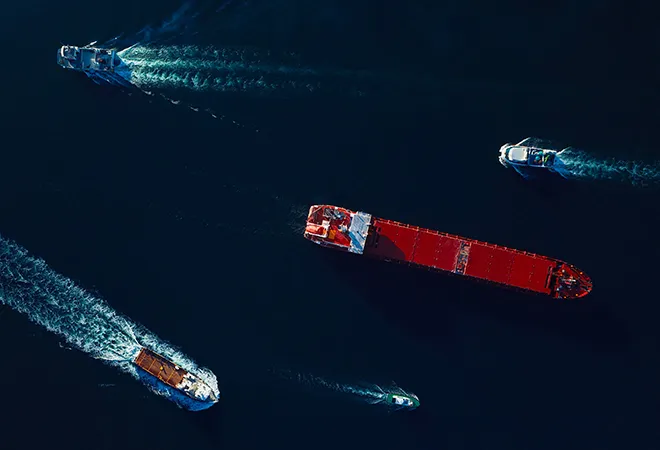 This article is part of the series—Raisina Edit 2021
This article is part of the series—Raisina Edit 2021
Value chains and the globalised production mode that they foster have become the most sensitive topic of geoeconomics — displacing issues such as the price of oil, energy and raw materials. They were once a key argument in favor of the liberalisation of trade and investment: basing the successive stages of a production process where there lies a comparative advantage is a straightforward extension of Adam Smith’s law from trade to direct investment.
It is not geopolitics alone, or the Sino-American rivalry, that have soured the honeymoon. The losses from delocalisation and “rustbelts” in industrialised countries and the resulting political challenge, and the environmental cost of transport of materials and intermediary goods on a huge scale have created some momentum for “relocalisation,” or thinking and producing “glocal.” These are much talked about political and societal trends, yet they have been less powerful than what followed.
It is not geopolitics alone, or the Sino-American rivalry, that have soured the honeymoon.
Indeed, supply crises — particularly evident for medical products since the COVID crisis began — are giving a much stronger impetus for a move from “just in time” to “just in case.” For the first time in decades (except in very narrow defence activities, where reliability usually prevailed over cost), security of supply can trump production costs and therefore suggests more self-reliance and less extended production chains. The world’s largest pandemic since a century created first, a competition for medical supplies, then a global race for vaccines. Reshoring and “vaccine nationalism” vie against the benefit of global cooperation.
On the heels of this crisis, the present emergency for industries over the supply of semi-conductors is also an accelerator, that has next to nothing to do with China (except of course its huge role in terms of intermediary consumption). It is rather a consequence of history’s fastest Schumpeterian cycle — the digitalisation of all aspects of our life which even a decade ago could not have been conceived on that scale. In addition, the digital features incorporated in objects — the IoT or Internet of Things — will also create more risks, for the collective (security threats) and for the individual (where the risks relate to privacy concerns).
It is rather a consequence of history’s fastest Schumpeterian cycle — the digitalisation of all aspects of our life which even a decade ago could not have been conceived on that scale.
These trends are leading to a rebirth of industrial policies, involving the state as much or more than the market. At this point, the doubts about supply chains based on pure market advantage do intersect the China challenge.
China — which was, one thought, to convert to a market economy — has instead become the vanguard of state-based innovation and technology. Successive development plans (of which the most famous, Industry 2025, was hidden from view following international backlash) have allocated enormous outlays in R&D, as is presently the case for the newly announced 14th 5-year Plan and the policy of “civil-military fusion” that has enlarged the grey zone around China’s formal defence budget — all testify to this top-down, state driven and geopolitical approach. There will be a counter-argument — that other East Asian economic “miracles” have also incorporated a search for independent technologies, for instance, in South Korea. None have been as systematic, broad-based and tied to the military and security establishment as China’s. None have fully coincided (even while some of them were authoritarian states until the 1970s or 1980s) with a Party-state monopoly, a complete lack of separation of powers, and the rebirth of a nationalism that is both strident and increasingly self-confident, as is the case in China. It is just not another economy aiming to become a “fully developed, rich and powerful” country by 2049. Not surprisingly, this has also led to a steadily increasing push for self-reliance. In president Xi Jinping’s own words, there is also another side to this policy: it is necessary to leverage economic integration and the reliance on Chinese technologies and finance to “reinforce the dependency of global industry supply chains on China.”
None have been as systematic, broad-based and tied to the military and security establishment as China’s.
It is from this vantage point that the debate about securing value chains and the policies of China’s partners — whether the United States, the European Union, India or others — should be approached. Non-political risks such as scarcities, breakdowns and environmental costs are joined today by a rising geopolitical risk.
The recognition of this risk is a completely different issue from that of the downside of delocalisation and job displacement. Instead, assessing the risk that suppliers may present in the value chain is becoming a priority. For instance, the European Union’s 5G networks toolbox for risk mitigating measures and assessing risk from the supplier now includes “the third country’s legislation, especially where there are no legislative or democratic checks and balances in place.” Investment screening, which has been implemented in the European Union since October 2020, is also a recognition of that risk, and is set to limit the freedom of investment that remains a key feature of the European Single Market. But to what length should these policies extend? Recognition of supply risks from China is neither universal nor complete. Should risk mitigation be limited to issues of national security? Even these can be stretched far. Should they include public order? This will include many public goods, from health resources to news organisations. What about critical infrastructure: as soon as they are digitalised? The simplest equipment, such as a power outlet, then becomes more vulnerable in itself or a means for a backdoor entry. Or should they extend to the maintenance of a competitive edge — which leads to wider technology or human resource denials and relocalisation away from China?
Not only does business know no borders, but the economic gains from global value chains are often thought to outweigh the risks.
One word, “decoupling,” has summed up all these options, and for many it has also become a symbol for a negative trend. Not only does business know no borders, but the economic gains from global value chains are often thought to outweigh the risks. Decoupling, like sanctions as a geopolitical tool, can be a substitute for outright conflict, and this has started a controversy that is likely to be as endless as the debate on whether sanctions actually work. Most of the big state actors have no single-minded purpose about it. Among these, India is an outlier: a combination of the border tensions and a slump in domestic demand have produced lower imports from China — while Indian exports to China are doing fine. Financial flows from the United States to China have actually increased in the past year — simply for business opportunities that identified positive Chinese interest rates as an opportunity (this may, in fact, end soon). Europeans have relied more, not less, on imports from China in 2020. It is China that is proving at this juncture to be the most single-minded and geopolitical actor, as befits the nature of its regime. While Chinese public diplomacy has often described its foreign policies as merely reactive, it has increasingly placed geopolitics in command, and displaced the policy of low profile and economic priority that had prevailed in the previous era.
The views expressed above belong to the author(s). ORF research and analyses now available on Telegram! Click here to access our curated content — blogs, longforms and interviews.



 This article is part of the series—
This article is part of the series— PREV
PREV


